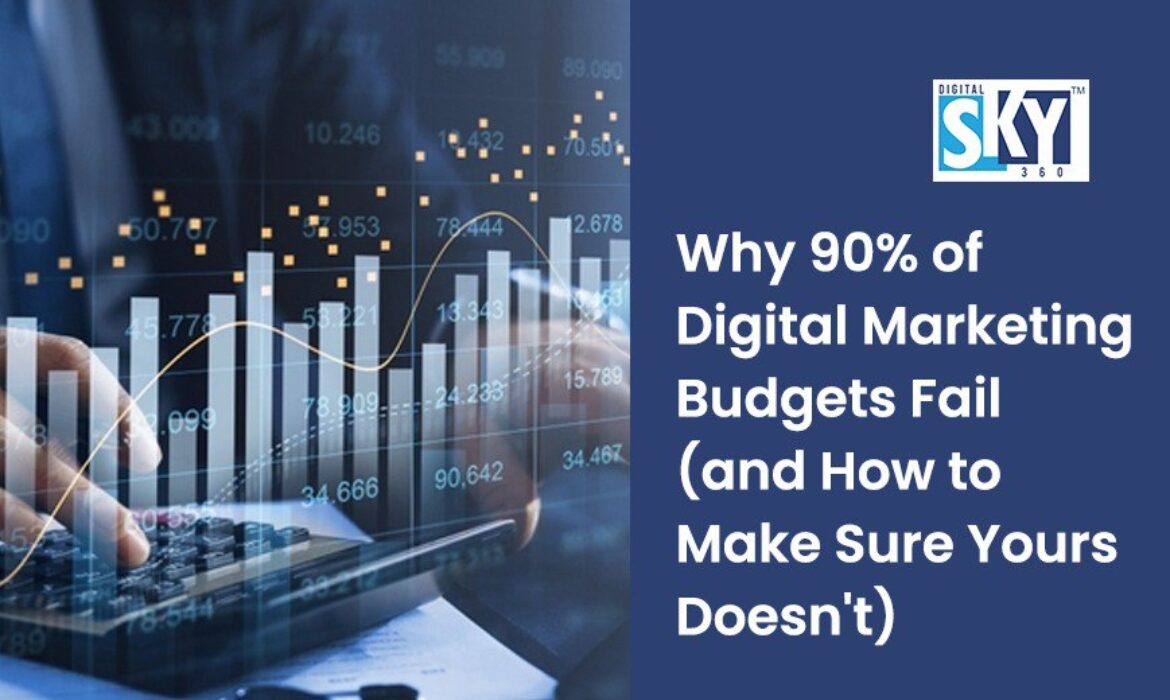Why 90% of Digital Marketing Budgets Fail (and How to Make Sure Yours Doesn’t)

Almost 90% of the businesses claim that their online marketing budget is not giving them as much ROI as they expected. Suppose you take months to save money, make the decision to invest it in online marketing, and then see your budget disappearing with minimal returns. It is frustrating, as though you are paying for a gym every month, and yet you are not losing weight.
This is the bitter truth that many entrepreneurs in Ahmedabad and India have to deal with. They drop a lot of money on advertisements, increase their content on social media, or reach out to freelancers, only to find out that their money is not operating as efficiently as they thought. One of the problems is that the digital marketing cost in India is misconstrued. People think that more money spent means more success, something that is not the case at all. It’s all about strategy and allocation.
The good news? You need not be a member of this 90%. This article will discuss the most popular causes of digital marketing budget failure and, more crucially, how to set a digital marketing budget that will lead to its growth.
Table of Contents
Why Do Most Digital Marketing Budgets Fail?
Lack of Clear Goals and KPIs
Starting campaigns without a destination is one of the largest errors that businesses make. Posting Facebook or Instagram ads without understanding whether you are seeking sales, leads, or web traffic is like getting on a bus without wondering where it goes.
There should be clear Key Performance Indicators (KPIs). These could include:
- ROI (Return on Investment)
- CTR (Click-Through Rate)
- Lead Quality
- Customer Acquisition Cost
Misallocation of Funds
The other significant cause of the digital marketing budget failure is the expenditure at the wrong locations. Most companies invest a lot in vanity, either in the form of likes, shares, or followers, without remembering that they do not necessarily translate into revenue.
A wiser solution is to combine short-term advertising with long-term investments in SEO. However, ads produce immediate outcomes; as soon as you give up on the payments, the leads become dead. SEO, on the other hand, continues to attract traffic with time.
In case you have a mind to go green in terms of growth, then you can engage a good SEO company in Ahmedabad. They can assist you in investing in search visibility that keeps on influencing results even after the campaign is over.
Ignoring the Customer Journey
Effective marketing is not all about selling, but it takes people through a process of awareness, consideration, and decision. A lot of businesses, particularly in other business areas such as real estate, fall into a trap of investing all their money in lead generation advertisements.
For example, a real estate agent can have Google Ads displaying with the text “2 BHK flats in Ahmedabad” and get leads. However, when they do not follow up such leads with case studies, email marketing, or follow-up content, the majority of the prospects drop.
That is where digital marketing services for real estate sector come in. The customer experience will not be a one-step push but rather a full journey.
Underestimating the Competition
Your rivals are not resting on their laurels. However, most of the businesses neglect competitor analysis or, even worse, imitate theirs.
A small firm in Ahmedabad may attempt to copy the advertising of a national brand, without the knowledge that the bigger firm has millions to invest in the brand. This can be a waste of money and time.
Unrealistic Expectations
Lastly, marketing success is usually murdered by impatience. After the initiation of SEO campaigns or content marketing, many businesspeople expect to get leads immediately.
However, techniques such as SEO and content require months to produce the outcomes. Developing trust in your audience is a process that cannot be achieved in one day. It is like planting a tree; it can never be a switch. In the absence of realistic schedules, businesses fail to stick to good strategies.
How to Set a Digital Marketing Budget That Works
Step 1 – Define Your Objectives
Begin with SMART goals (Specific, Measurable, Achievable, Relevant, and Time-bound).
As an example: 50 qualified leads through social media marketing every month in 6 months.
Clear goals will enable you to make decisions on the amount to spend and where.
Step 2 – Know Your Industry Standards
Most companies, on average, spend 7-10% of their income on marketing. Indian digital marketing agencies are not as expensive everywhere.
- Retail & E-commerce: Increased investment in paid advertisements.
- Healthcare: More emphasis on the content of trust.
- Real estate: A combination of SEO, PPC, and lead nurturing campaigns.
Competition with your industry will make sure that you do not spend less or more.
Step 3 – Break Down Your Channels
Each rupee in your marketing budget must work. An alternative strategy could be as follows:
This disintegration eliminates excessive reliance on one channel.
Step 4 – Monitor and Adjust Regularly
Digital marketing cannot be a set-it-and-forget-it activity. Performance monitoring should be done with the help of such tools as Google Analytics, social media dashboards, and A/B testing.
Campaign reviews should be done at least once a month to make sure you are minimizing waste and investing more in what is working.
Pro Tips to Avoid Digital Marketing Budget Failure
- Invest in Research: Learn all about your target audience.
- Diversify Spend: Disseminate in SEO, PPC, social, and content.
- Concentrate on ROI, Not Vanity Metrics: Sales are more important than likes.
- Find the Right Partner: An online advertising firm takes care of your budget.
FAQs
Q1: What is the largest cause of failure of digital marketing budgets?
Inability to have a defined strategy and dependence on a single channel.
Q2: What is the amount a small business in India needs to spend on digital marketing?
7-10% of revenue as a rule. Nevertheless, actual spending changes depending on the competition and goals.
Q3: Is SEO still an outstanding investment compared to paid advertising?
Yes, SEO generates traffic that is lasting but the advertisements stop as long as you no longer pay.
Q4: How do I tell whether my digital marketing budget is performing?
Track ROI, lead quality, and conversion rates, not clicks or likes.
Q5: Does a digital marketing firm really benefit small businesses?
A: Absolutely. Agencies introduce skills, resources, and tactics that conserve time and yield optimal returns.
Conclusion
The reality is that 90% of digital marketing budget failures occur due to a lack of goals, inappropriate allocation, and no monitoring. However, this is not a trap your business has to take.
By having clear objectives, effective channel management, performance measurement, and engaging professionals in the process, you will be in a position to make your marketing budget an effective growth engine.
Digital Sky 360 is at hand to help you in coming up with a strategy that will ensure every rupee will count. And when you have a strategy you like, your budget is not going to just survive, it is going to thrive.





